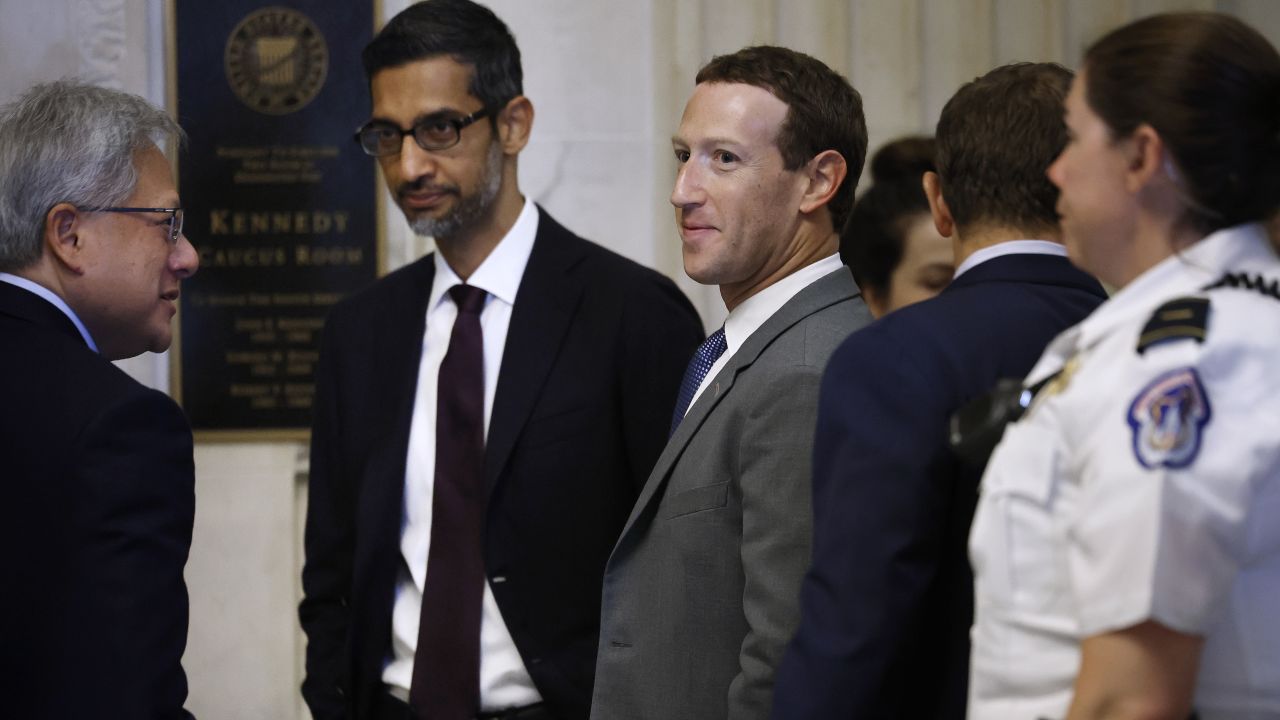Musk, Zuckerberg, Gates, Other Tech Leaders in Closed Senate Session About Ai
In a closed Senate session, Musk, Zuckerberg, Gates, and other tech leaders discussed AI, presenting concise and accurate insights. This article provides an introduction to the points raised during the session.
The focus is on addressing concerns and exploring the potential of artificial intelligence.
Musk’S Concerns About Ai Development
Tech leaders, including Musk, Zuckerberg, and Gates, recently participated in a closed Senate session discussing concerns about the development of artificial intelligence (AI). The discussions aimed to address the potential risks associated with AI advancements.
Musk’S Strong Position On Ai Risks:
- Musk, a prominent figure in the tech industry, has been vocal about his concerns regarding the risks associated with the development of AI.
- He believes that AI possesses significant dangers if not properly regulated and safeguards are not put in place.
- Musk’s strong position on AI risks stems from his belief that the rapid advancement of AI technology without proper oversight could lead to unintended consequences and potentially threaten humanity.
His Statements On The Need For Regulation And Oversight:
- Musk has repeatedly emphasized the need for regulation and oversight in the field of AI to ensure its safe and ethical development.
- He believes that without proactive measures, AI could be misused or become uncontrollable, posing a threat to society.
- Musk’s statements regarding regulation and oversight reflect his belief that these measures are crucial in managing AI’s potential risks and protecting humanity from its negative impacts.
Musk’S Call For Proactive Measures To Ensure Safety:
- Musk advocates for proactive measures to be taken in order to guarantee the safety of AI technology.
- He emphasizes the importance of preemptive action to address potential risks before they materialize.
- Musk’s call for proactive measures encompasses initiatives such as establishing safety protocols, conducting thorough research, and promoting responsible AI development practices.
Musk’s concerns about AI development are centered around the risks it poses, and he strongly believes in the need for regulation, oversight, and proactive measures to ensure its safe and beneficial use. His stance on AI highlights the importance of addressing potential dangers associated with its rapid advancement.
Zuckerberg’S Vision For Ai
Tech leaders including Musk, Zuckerberg, and Gates recently participated in a closed Senate session to discuss AI. Zuckerberg’s vision for AI was a key topic of the discussion, highlighting the importance of this advanced technology in shaping the future.
Zuckerberg’S Optimistic View On Ai’S Potential:
- AI as a force for good: Mark Zuckerberg has long been an ardent advocate for the potential benefits of artificial intelligence (AI). During the closed Senate session, he emphasized that AI can have a positive impact on various aspects of society, ranging from healthcare to education and beyond. He firmly believes that with the right approach, AI can be harnessed to solve some of humanity’s biggest challenges.
- Enhancing human potential: Zuckerberg’s vision for AI includes empowering individuals by augmenting their capabilities through intelligent systems. He envisions AI as a tool that can amplify human potential and productivity, enabling people to achieve more and make a positive difference in the world. He sees AI as an enabler rather than a replacement for human skills and expertise.
- Enabling personalized experiences: Another aspect highlighted by Zuckerberg is the ability of AI to deliver highly personalized and tailored experiences. By leveraging machine learning algorithms, AI can understand individuals’ preferences, interests, and needs, thereby enhancing the overall user experience. This can be seen in various applications such as social media platforms, recommendation systems, and personalized advertisements.
Challenges Addressed By Zuckerberg During The Session:
- Ethical concerns: Zuckerberg openly acknowledged that AI presents ethical challenges and needs careful handling. He stressed the importance of ensuring that AI systems are designed and employed in a way that prioritizes ethical considerations, fairness, and transparency. By addressing these concerns, he aims to avoid the development of AI technologies that could cause harm or reinforce biased behaviors.
- Data privacy and security: During the session, Zuckerberg discussed the critical issue of data privacy and security in the context of AI. He highlighted the need for robust privacy measures to protect individuals’ personal information and prevent any misuse. As AI heavily relies on large data sets, the responsible handling of data becomes paramount, and policies must be in place to safeguard against potential risks.
- Workforce displacement and re-skilling: Alongside the potential benefits, Zuckerberg acknowledged the real concerns about job displacement due to AI automation. He emphasized the need for proactive measures to address this issue, such as investments in re-skilling and upskilling programs to ensure that individuals can adapt to the evolving job market. He believes that by focusing on education and equipping people with the right skills, the negative impact of workforce displacement can be mitigated.
Zuckerberg’s vision for AI is rooted in its potential to serve as a force for good, enhancong human potential, and delivering personalized experiences. However, he is aware of the challenges posed by ethical concerns, data privacy, security, and workforce displacement.
By proactively addressing these challenges, Zuckerberg aims to shape AI development in a responsible and beneficial manner.
Gates’ Perspective On Ai
In a closed Senate session discussing AI, Bill Gates offered his unique perspective, joining other tech leaders like Musk and Zuckerberg.
Gates’ Perspective On Ai’S Impact On Society:
- Gates believes that the development of AI has the potential to greatly impact society in both positive and negative ways.
- The rapid advancement of AI technology has already begun to transform various aspects of our lives, ranging from healthcare to transportation.
- While Gates acknowledges the benefits AI can bring, he believes it is crucial to address the potential negative consequences and ensure that its use is ethical and serves the greater good of humanity.
His Concerns About Potential Job Displacement:
- One of Gates’ main concerns regarding AI is the potential displacement of jobs.
- With the increasing automation capabilities of AI, there is a fear that many jobs could become obsolete, resulting in widespread unemployment.
- Gates emphasizes the importance of preparing for this transition by providing retraining and upskilling opportunities to ensure that individuals are equipped with the skills needed for the jobs of the future.
Gates’ Proposals For Mitigating Ai’S Negative Consequences:
- In order to mitigate AI’s negative consequences, Gates proposes several strategies:
- Implementing policies and regulations to address the ethical implications of AI, ensuring it is used responsibly and for the benefit of society.
- Investing in education and training programs that focus on developing skills that cannot be easily replaced by AI, such as critical thinking, creativity, and emotional intelligence.
- Encouraging collaboration between governments, businesses, and experts to establish guidelines and shared best practices for the development and deployment of AI.
- Supporting research and development in areas such as AI safety and bias reduction to minimize potential risks associated with AI systems.
- Promoting inclusivity and diversity in AI development to prevent bias and ensure that the technology benefits all segments of society.
Gates’ perspective on AI is one of cautious optimism. While recognizing its potential, he emphasizes the need to address its societal impact and take proactive measures to minimize any negative consequences. By focusing on ethical use, education, collaboration, and research, Gates believes that AI can be harnessed for the betterment of humanity.

Credit: www.cnn.com
Other Tech Leaders’ Contributions
Musk, Zuckerberg, Gates, and other leading tech figures were called to a closed session in the Senate to discuss the impact of AI. Their valuable insights and contributions shed light on the potential risks and benefits of this emerging technology.
Several tech leaders recently participated in a closed Senate session to discuss the development of artificial intelligence (AI). While much of the attention has focused on the likes of Elon Musk, Mark Zuckerberg, and Bill Gates, it’s important to acknowledge the valuable contributions made by other tech leaders as well.
In this section, we will provide an overview of their perspectives on AI development, as well as highlight the issues they raised and the proposed solutions.
Various Tech Leaders Who Participated In The Closed Session:
- Satya Nadella (Microsoft): Emphasized the importance of responsible AI development and the need for transparent algorithms.
- Sundar Pichai (Google): Discussed the potential benefits of AI in areas such as healthcare and climate change, along with the ethical considerations involved.
- Jeff Bezos (Amazon): Highlighted the capabilities of AI in revolutionizing customer experiences and transforming industries, while also emphasizing the importance of proper governance.
- Tim Cook (Apple): Focused on privacy concerns related to AI and the need for strong data protection regulations.
- Jack Ma (Alibaba Group): Explored the potential of AI in boosting economic growth and improving productivity, while acknowledging the need for collaboration to address its challenges.
Overview Of Their Perspectives On Ai Development:
- Responsible AI: Many tech leaders highlighted the importance of responsible AI development, ensuring that algorithms are transparent and accountable.
- Ethical Considerations: The ethical implications of AI were a key concern for these leaders, with a focus on issues such as privacy, bias, and discrimination.
- Potential Benefits: They also discussed the numerous opportunities presented by AI, such as advancements in healthcare, environmental sustainability, and economic growth.
- Data Protection: Several leaders stressed the need for robust data protection measures to safeguard user privacy and prevent misuse of AI technologies.
- Collaboration: Tech leaders recognized the importance of collaboration among industry, government, and academia to address the challenges posed by AI.
Issues Raised And Solutions Proposed By Other Tech Leaders:
- Bias and Discrimination: Leaders acknowledged the risk of biased AI algorithms and proposed implementing strict guidelines and diverse teams to address these issues.
- Lack of Regulation: They called for the development of regulations and governance frameworks that balance innovation with the protection of society.
- Skilled Workforce: Leaders highlighted the need for investments in AI education and training to bridge the skills gap and ensure a competent workforce.
- Public Trust: They emphasized the importance of building public trust through transparency and open dialogue about AI development and deployment.
- Responsible Use: Leaders expressed the need for AI systems to be designed and used responsibly, with considerations for potential negative impacts and unintended consequences.
These tech leaders contributed valuable insights and perspectives to the closed Senate session, providing a comprehensive understanding of the challenges and opportunities associated with AI development. Their recommendations and proposed solutions will shape the future of AI policy and governance, ensuring the responsible and beneficial deployment of this transformative technology.
Senate’S Dialogue On Ai Policies
Top tech leaders, including Musk, Zuckerberg, and Gates, participated in a closed Senate session on AI policies. The dialogue aimed to address the challenges and opportunities associated with artificial intelligence.
In a closed-door session, tech leaders including Elon Musk, Mark Zuckerberg, and Bill Gates recently engaged with the Senate to discuss the potential implications and policies surrounding artificial intelligence (AI). The progressive development of AI technology has sparked both excitement and concerns globally.
This blog post delves into the details of the Senate’s dialogue, highlighting senators’ questions and concerns, the discussion on potential regulations and ethical considerations, as well as a summary of the Senate’s stance on the future development of AI.
Senators’ Questions And Concerns Regarding Ai:
- Privacy concerns and data security in the context of AI technology.
- The potential impact of AI on employment and the economy.
- The responsibility of tech companies in ensuring transparency and fairness in AI algorithms.
- The ethical implications of AI, particularly in areas such as healthcare and criminal justice.
- The role of AI in exacerbating inequality and discrimination in society.
- International collaboration and standards in AI development.
- The potential risks and safeguards in autonomous machines and systems.
Discussion On Potential Regulations And Ethical Considerations:
- Establishing a regulatory framework that encourages innovation while addressing potential risks and concerns.
- Developing guidelines to ensure the responsible and ethical use of AI across sectors.
- Collaborating with tech companies to create and enforce industry standards for AI development.
- Promoting accountability and transparency in AI algorithms and decision-making processes.
- Ensuring data privacy and security in the context of AI advancements.
Summary Of The Senate’S Stance On Ai Development:
- The Senate acknowledges the transformative potential of AI and its importance for economic growth and innovation.
- They understand the need for a balanced approach, considering both the benefits and risks associated with AI.
- The Senate emphasizes the importance of robust regulations to address concerns related to privacy, inequality, and potential negative impacts on employment.
- They recognize the ethical implications of AI and stress the importance of responsible AI development and deployment.
- Collaboration between policymakers, tech leaders, and other stakeholders is crucial to establish effective policies and regulations in the rapidly evolving AI landscape.
Through this closed Senate session, an important dialogue addressing AI policies and regulations took place. With senators voicing their questions and concerns, and discussions on potential regulations and ethical considerations, the Senate is actively shaping the future of AI development and deployment.
Their goal is to foster an environment that encourages responsible innovation while safeguarding privacy, ethics, and societal impact.
Future Implications Of The Senate Session
Tech leaders such as Musk, Zuckerberg, Gates, and others participated in a closed Senate session to discuss the future implications of AI. The Senate session explored the potential impacts and challenges of artificial intelligence on society.
Artificial intelligence (AI) has rapidly gained prominence in recent years, with technology leaders Elon Musk, Mark Zuckerberg, and Bill Gates among those advocating for responsible AI development. A closed session was recently held in the Senate where these tech moguls discussed the future implications of AI.
We will delve into the influence and impact of the session on AI development, potential policies and regulations that may be enacted, as well as predictions for the future of AI based on the Senate session conclusions.
The Influence And Impact Of The Closed Session On Ai Development:
- Collaboration: The closed session provided an opportunity for tech leaders to collaborate and share their insights on AI development, fostering a spirit of cooperation among industry pioneers.
- Knowledge sharing: By having such influential figures in one room, the session allowed for the exchange of ideas, experiences, and lessons learned in the field of AI. This collective knowledge has the potential to shape and advance the future of AI development.
- Public awareness: The closed session brought attention to the importance and potential risks associated with AI technology, raising public awareness about the need for responsible and ethical AI practices.
- Investor confidence: The discussion held during the Senate session showcased the commitment of tech leaders towards AI development. This can instill confidence in investors who may be interested in supporting AI initiatives.
Potential Policies And Regulations That May Be Enacted:
- Ethical guidelines: The closed session may lead to the establishment of ethical guidelines to steer AI development towards responsible practices. These guidelines can address issues such as privacy, accountability, and bias in AI algorithms.
- Data protection: As AI heavily relies on data, there is a possibility that the Senate session will influence policy decisions related to data protection, ensuring that AI systems are built on a foundation of secure and ethically sourced data.
- Safety standards: The closed session discussions may prompt the creation of safety standards for AI technologies. These standards would aim to mitigate potential risks and ensure that AI systems are designed and deployed with the utmost safety precautions in mind.
Predictions For The Future Of Ai Based On The Senate Session Conclusions:
- Increased funding: Following the closed session, it is likely that there will be an increase in funding for AI research and development. This boost in financial support can lead to significant advancements in AI technology and applications.
- Regulatory advancements: The Senate session might pave the way for the implementation of comprehensive regulations specifically tailored to the rapidly evolving AI industry. These regulations could provide a framework to ensure ethical practices and address the concerns associated with AI technology.
- Societal integration: The discussions held during the closed session may accelerate the integration of AI into various sectors, such as healthcare, transportation, and education. This integration has the potential to revolutionize industries, improving efficiency and augmenting human capabilities.
The closed Senate session featuring influential tech leaders not only sheds light on the future implications of AI but also sets the stage for potential policies, regulations, and predictions that may shape the ongoing development of this transformative technology. As society moves forward, the impact of this session on AI will undoubtedly play a crucial role in shaping a responsible and sustainable AI future.
Frequently Asked Questions Of Musk, Zuckerberg, Gates, Other Tech Leaders In Closed Senate Session About Ai
What Was The Purpose Of The Closed Senate Session With Musk, Zuckerberg, Gates, And Other Tech Leaders?
The purpose of the closed Senate session was to discuss the implications and potential risks of artificial intelligence (AI) technology. They aim to address concerns around privacy, security, and the ethical use of AI in society. This meeting allowed experts to provide valuable insights and collaborate on creating appropriate regulations and guidelines.
Why Were Musk, Zuckerberg, Gates, And Other Tech Leaders Selected To Participate In The Closed Senate Session?
Musk, Zuckerberg, Gates, and other tech leaders were chosen for the closed Senate session due to their influential roles within the field of technology and their expertise in AI. Their insights and experiences make them valuable contributors to the discussions surrounding the impact of AI on society, privacy, and regulation.
What Are The Main Concerns Surrounding Artificial Intelligence (Ai) Technology?
The main concerns regarding AI technology revolve around potential privacy breaches, security vulnerabilities, and the ethical implications. There are fears of AI replacing jobs, biased algorithms, and infringing on individual rights. The closed Senate session aimed to address these concerns and devise strategies for responsible development and implementation of AI.
How Will The Closed Senate Session Impact The Future Of Ai Technology?
The closed Senate session involving tech leaders like Musk, Zuckerberg, and Gates will have a significant impact on the future of AI technology. It provides an opportunity to harness their expertise and insights, leading to constructive discussions and the formulation of appropriate regulations.
This session will greatly contribute to the responsible growth and utilization of AI in society.
Conclusion
As the closed Senate session concluded, it became evident that the discussion around artificial intelligence (AI) was of utmost importance to some of the leading tech visionaries of our time. Elon Musk, Mark Zuckerberg, Bill Gates, and other industry giants gathered to address the potential risks associated with AI, emphasizing the need for regulation and ethical guidelines.
It is encouraging to witness such influential figures recognizing the significance of this technology and taking proactive measures to ensure its responsible development. The session shed light on the intricate balance required between innovation and safeguarding against potential harm. This conversation will undoubtedly shape the future trajectory of AI, paving the way for policies that prioritize the well-being of society.
The collaboration between these tech leaders and policymakers highlights the importance of societal involvement and stakeholder engagement for successful implementation of emerging technologies. Moving forward, it is crucial for all stakeholders to remain actively engaged in these discussions, contributing to the development of AI for the benefit of all.














Post Comment